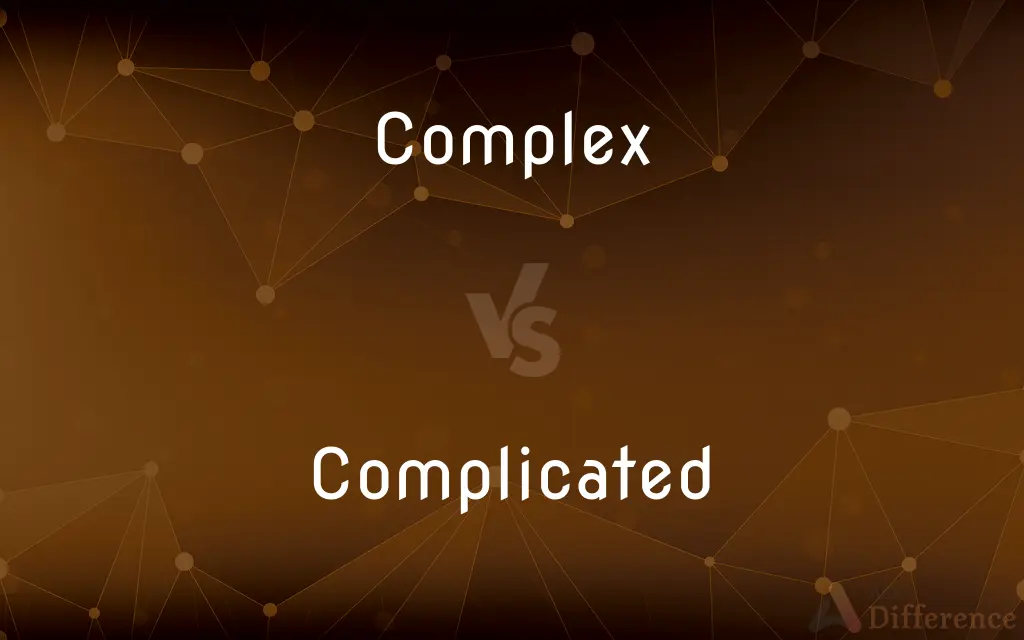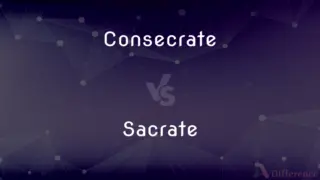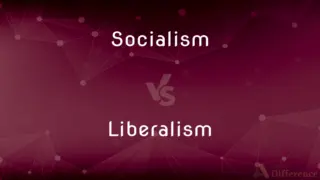Complex vs. Complicated — What's the Difference?
By Maham Liaqat & Fiza Rafique — Updated on March 24, 2024
Complex systems have interconnected parts with adaptive behaviors, whereas complicated systems, though intricate, behave predictably under the same conditions.

Difference Between Complex and Complicated
Table of Contents
ADVERTISEMENT
Key Differences
Complex systems are characterized by their interconnected components that interact in dynamic, often unpredictable ways. These interactions can lead to emergent properties, meaning the whole becomes more than just the sum of its parts. Whereas, complicated systems, despite also having multiple components, operate in a predictable manner. Their behavior can be fully understood through analysis of their individual parts.
In complex systems, the relationship between parts is non-linear, and small changes can have disproportionate effects. This sensitivity to initial conditions is a hallmark of complexity. On the other hand, complicated systems exhibit linear relationships, where changes in input directly affect the output in a predictable fashion.
The adaptability of complex systems is another distinguishing feature. They can learn from experience and adjust to changes in the environment, enhancing their survivability. Complicated systems lack this ability; they operate based on predefined rules without the capacity for learning or adaptation.
Complex systems often defy reductionist approaches, which means they cannot be fully understood by dissecting them into their constituent parts. In contrast, complicated systems can be understood, and often designed or engineered, by meticulously analyzing and assembling their components.
Understanding and managing complex systems require holistic and often innovative approaches, focusing on relationships and patterns rather than individual elements. Complicated systems, however, can be managed and engineered through traditional methodologies that emphasize detail-oriented planning and execution.
ADVERTISEMENT
Comparison Chart
Predictability
Unpredictable due to interactions and adaptation
Predictable behavior based on known principles
Relationships
Non-linear and dynamic
Linear and static
Approach to Analysis
Holistic, emphasizing patterns and relationships
Reductionist, focusing on individual components
Capacity for Learning
Adaptive, capable of learning from experience
Operates based on predefined rules
Management
Requires innovative, adaptive strategies
Managed through traditional, detailed planning
Compare with Definitions
Complex
Consisting of many different and connected parts.
A complex network of roads simplifies travel but complicates navigation.
Complicated
Involving many steps or stages; not simple.
Planning a wedding can be a complicated affair.
Complex
A system that exhibits emergent properties.
The human brain is complex, with its functionality transcending its physical structure.
Complicated
Difficult to analyze, understand, or explain due to intricate elements.
The instructions were too complicated to follow.
Complex
Capable of adaptation and learning from the environment.
Ecosystems are complex systems that evolve over time.
Complicated
Requiring detailed and specific knowledge or skills.
Repairing the clock is a complicated process.
Complex
Marked by a complicated arrangement of parts, units, or aspects.
Complex machinery requires skilled operators to manage.
Complicated
Consisting of many interconnecting parts or elements.
Assembling a complicated model requires patience and precision.
Complex
Involving many variables and parts that interact in intricate ways.
Weather patterns are complex and difficult to predict accurately.
Complicated
Governed by or conforming to a set of rules or standards.
Filing taxes can be a complicated process due to the many regulations.
Complex
Consisting of interconnected or interwoven parts; composite
Complex equipment with multiple components.
Complicated
Consisting of many interconnecting parts or elements; intricate
A complicated stereo system
Complex
Composed of two or more units
A complex carbohydrate.
Complicated
Involving complications
Complicated appendicitis
Complex
Difficult to understand for being intricate or involved; complicated
A complex problem.
Complicated
Containing intricately combined or involved parts.
Complex
Consisting of at least one bound form. Used of a word.
Complicated
Not easy to understand or analyze because of being intricate
A complicated personality.
Complex
Consisting of an independent clause and at least one other independent or dependent clause. Used of a sentence.
Complicated
Difficult or convoluted.
It seems this complicated situation will not blow over soon.
Complex
A whole composed of interconnected or interwoven parts
A complex of cities and suburbs.
The military-industrial complex.
Complicated
(biology) Folded longitudinally (as in the wings of certain insects).
Complex
A building or group of buildings used for a single purpose
A sports complex.
Complicated
Simple past tense and past participle of complicate
The process of fixing the car engine was complicated by the lack of tools.
Complex
In psychoanalysis, a group of related, often repressed ideas and impulses that compel characteristic or habitual patterns of thought, feelings, and behavior.
Complicated
Difficult to analyze or understand;
A complicated problem
Complicated Middle East politics
Complex
An exaggerated or obsessive concern or fear
Has a complex about his weight.
Complex
(Medicine) The combination of factors, symptoms, or signs of a disease or disorder that forms a syndrome.
Complex
Made up of multiple parts; composite; not simple.
A complex being; a complex idea
Complex
Not simple, easy, or straightforward; complicated.
Complex
Having the form a + bi, where a and b are real numbers and i is (by definition) the imaginary square root of −1.
Complex number
Function of a complex variable
Complex
Whose range is a subset of the complex numbers.
Complex function
Complex
Whose coefficients are complex numbers; defined over the field of complex numbers.
Complex polynomial
Complex algebraic variety
Complex
(geometry) A curve, polygon or other figure that crosses or intersects itself.
Complex
A problem. en
Complex
A network of interconnected systems.
Military-industrial complex
Complex
A collection of buildings with a common purpose, such as a university or military base.
Complex
An assemblage of related things; a collection.
Complex
An organized cluster of thunderstorms.
Complex
A cluster of wildfires burning in the same vicinity.
The fire complex began as two separate fires.
Complex
(taxonomy) A group of closely related species, often distinguished only with difficulty by traditional morphological methods.
Complex
(psychoanalysis) An abnormal mental condition caused by repressed emotions.
Complex
A vehement, often excessive psychological dislike or fear of a particular thing.
Jim has a real complex about working for a woman boss.
Complex
(chemistry) A structure consisting of a central atom or molecule weakly connected to surrounding atoms or molecules, as for example coordination complexes in inorganic chemistry and protein complexes in biochemistry.
Complex
(math) A complex number.
Complex
(linguistics) A multimorphemic word, one with several parts, one with affixes.
Complex
To form a complex with another substance
Complex
(transitive) To complicate.
Complex
Composed of two or more parts; composite; not simple; as, a complex being; a complex idea.
Ideas thus made up of several simple ones put together, I call complex; such as beauty, gratitude, a man, an army, the universe.
Complex
Involving many parts; complicated; intricate.
When the actual motions of the heavens are calculated in the best possible way, the process is difficult and complex.
Complex
Assemblage of related things; collection; complication.
This parable of the wedding supper comprehends in it the whole complex of all the blessings and privileges exhibited by the gospel.
Complex
A conceptual whole made up of complicated and related parts;
The complex of shopping malls, houses, and roads created a new town
Complex
A compound described in terms of the central atom to which other atoms are bound or coordinated
Complex
(psychoanalysis) a combination of emotions and impulses that have been rejected from awareness but still influence a person's behavior
Complex
A whole structure (as a building) made up of interconnected or related structures
Complex
Complicated in structure; consisting of interconnected parts;
A complex set of variations based on a simple folk melody
A complex mass of diverse laws and customs
Common Curiosities
What makes a system complex?
A system becomes complex due to the dynamic and non-linear interactions among its parts, leading to emergent properties.
How do you manage a complex system?
Managing a complex system requires adaptive, holistic strategies focusing on relationships and patterns.
Can a complicated system become complex?
A complicated system remains predictable and does not exhibit the adaptive, emergent properties of a complex system.
Are all complicated systems also complex?
Not all complicated systems are complex; complexity involves adaptability and emergence, beyond mere intricacy.
Why are complex systems unpredictable?
The unpredictability of complex systems stems from their sensitive dependence on initial conditions and the non-linear interactions of their components.
How does adaptability differ between complex and complicated systems?
Complex systems adapt and learn from experience, whereas complicated systems do not possess these adaptive capabilities.
What is an example of a complicated system?
A mechanical watch is an example of a complicated system, intricate but predictable in its operation.
What is an example of a complex system?
An ecosystem is an example of a complex system, characterized by adaptive, interdependent relationships among organisms.
Why are complicated systems easier to manage than complex systems?
Complicated systems are easier to manage due to their predictability and the linear relationship between their parts.
What role does linearity play in complex vs. complicated systems?
Linearity is a feature of complicated systems where outputs directly correspond to inputs, unlike the non-linear interactions in complex systems.
Is the internet considered a complex or complicated system?
The internet is considered a complex system due to its vast, interconnected nature and capacity for evolution and adaptation.
Can a complex system be fully understood?
Due to their emergent and adaptive qualities, complex systems often defy complete understanding through traditional analytical methods.
How do emergent properties manifest in complex systems?
Emergent properties in complex systems arise from the intricate interactions among components, resulting in behaviors not evident from the parts alone.
Can the complexity of a system be reduced?
The complexity of a system can be managed but not fundamentally reduced, as it is inherent to the system's nature.
What is the significance of understanding complexity in systems?
Understanding complexity is crucial for effectively managing and interacting with systems that have significant impacts on society and the environment.
Share Your Discovery

Previous Comparison
Consecrate vs. Sacrate
Next Comparison
Socialism vs. LiberalismAuthor Spotlight
Written by
Maham LiaqatCo-written by
Fiza RafiqueFiza Rafique is a skilled content writer at AskDifference.com, where she meticulously refines and enhances written pieces. Drawing from her vast editorial expertise, Fiza ensures clarity, accuracy, and precision in every article. Passionate about language, she continually seeks to elevate the quality of content for readers worldwide.















































